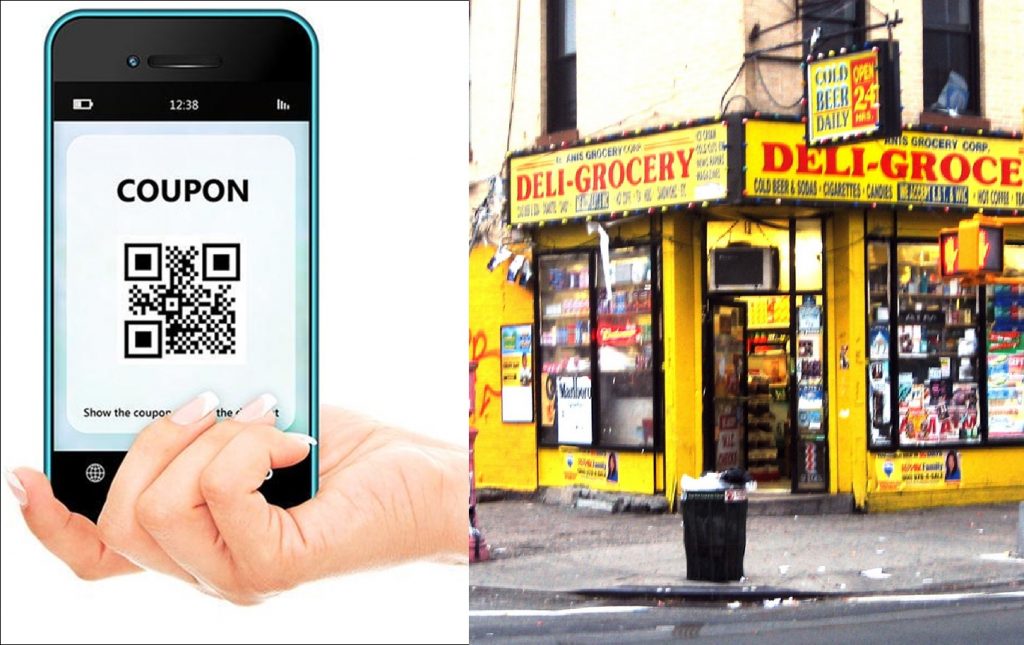
News about a new digital coupon platform will come as good news to city dwellers who shop at small neighborhood grocery stores. But it could also be welcome news to those interested in fighting fraud – and preventing terrorists from using coupons to fund their operations around the world.
Can coupons for 50 cents off soap or toilet paper really help build bombs? Possibly. But more on that later.
The new couponing platform is called dCoupon. It’s a mobile couponing service designed for use by millions of urban grocery shoppers. Those shoppers typically don’t have access to a Walmart, Safeway or Kroger. So they get most of their groceries at neighborhood stores – or bodegas – small, limited-selection grocers with a limited ability to offer or accept coupons. With dCoupon, currently being marketed to manufacturers, these shoppers and stores will gain access to easy-to-redeem digital coupons that typically are only available for use at much larger retailers.
“With paper coupons losing relevance, and existing digital coupon services that de facto exclude independent supermarkets and convenience stores from the couponing ecosystem, we expect adoption and expansion of our unique model to provide coupon benefits to many more neighborhoods around the world,” said Chai Outmezguine, CEO of Scanbuy, the mobile marketing company behind the new couponing platform. “This is a historic agreement that will deliver immediate savings to our customers and expand technology to help our stores grow their business,” added Rudy Fuertes, President of the National Supermarket Association, which represents independent urban grocery store owners.
Left unstated was another potential benefit – eliminating some of the fraud that costs manufacturers hundreds of millions of dollars each year.
Some urban bodegas have a reputation as hotbeds of coupon fraud, submitting coupons for reimbursement for products they don’t carry and didn’t sell, in the hopes of getting a little something extra from the manufacturers.
A few have been known to take it much further. In one of the most notorious recent examples, executives with the former coupon processing company International Outsourcing Services are accused of conspiring with small, independent grocers to defraud manufacturers out of some $250 million. They’re accused of having “chop crews” cut out scores of coupons from inserts, tossing them into a cement mixer to make them look used, and commingling them with coupons submitted by larger retailers to avoid raising any suspicions.
And then there’s the terrorism angle.
For decades, private investigator Ben Jacobson, who once worked for coupon processor NCH Marketing Services, has warned that bodega-centered coupon fraud is helping to fund terror activites around the globe. In testimony to a Congressional panel nearly 20 years ago, he cited numerous cases in which he said individuals with terror ties were using urban grocery stores as a front, to turn coupons into cash – by submitting coupons for reimbursement that were never actually used by consumers. The money they received from manufacturers, he said, helped fund everything from Palestinian militant groups to the 1993 World Trade Center bombing.
However, “I was unable to enlist the substantive aid of any law enforcement agency or prosecutor’s office” in investigating potential terror connections, he lamented to lawmakers. “Today, as I understand it, the fraud schemes continue, unabated, unchallenged, and facilitated by computers and the internet.”
So enabling the acceptance of digital coupons at small urban grocery stores could potentially mean a lot more than just making couponing more convenient for shoppers. It could make large-scale coupon fraud less convenient for some of the small grocers that perpetrate it. And with the exception of the fraudsters, and possibly the terrorists, that could turn out to be good for everyone.















